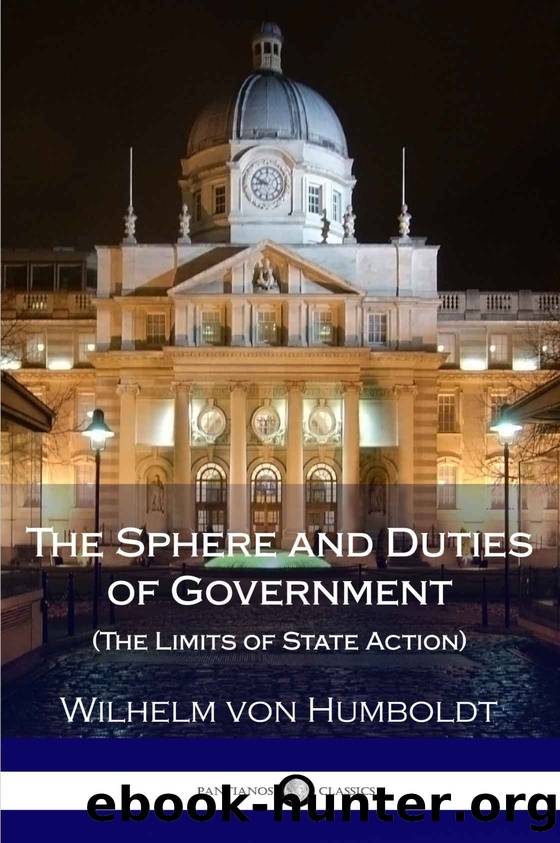The Sphere and Duties of Government (The Limits of State Action) by Wilhelm von Humboldt

Author:Wilhelm von Humboldt [Humboldt, Wilhelm von]
Language: eng
Format: epub
Published: 2017-12-13T07:00:00+00:00
Chapter Nine - The Solicitude of the State for Security More Accurately and Positively Defined - Further Development of the Idea of Security
After having now completed the more important and difficult portions of the present inquiry, and approached nearer to the solution of the great problem which it involves, it becomes necessary to review its progress up to this point, and endeavour to sum up its results.
Firstly, then, we have seen sufficient reasons for withdrawing the exercise of State solicitude from all such objects as do not immediately relate to the external or internal security of its citizens. In the second place, this same security has been represented as the real object of political activity; and, lastly, it has been agreed, that no efforts are allowable for the promotion of this object which are designed to operate on the morals and character of the nation itself, or to impart or counteract in them any definite direction. To a certain extent, therefore, the question as to the proper limits of State agency appears to be already fully solved, seeing that the sphere of this agency is confined to the preservation of security; and as to the means available for that purpose, still more narrowly restricted to those which do not interfere, for State ends, with the development of national character, or, rather, do not mould and fashion it with a view to those ends. For although, it is true, this definition is so far purely negative, yet that which remains after this abstraction of different departments of solicitude is of itself sufficiently distinct. That is, it is evident that political activity can only extend its influence to such actions as imply a direct trespass on the rights of others; to the task of deciding in cases of disputed right; to redressing the wronged, and punishing the wrong-doers. But the idea of securityâtowards defining which nothing further has been observed than that it embraces security against the attacks of foreign enemies, and against the aggressive spirit of fellow-citizens,âis too wide and comprehensive not to require some more special exposition. For, just as there are great and important differences between the modifications brought about by that advice which only seeks to persuade, and those consequent on importunate recommendation, and between these and the influence of positive coercion; and just as the degrees of unfairness and injustice may vary, from actions exercised within the limits of oneâs own right, but possibly hurtful to another, to those which likewise do not trespass those limits, but often or always tend to disturb some other in the enjoyment of his own, and again from these to actual encroachments on anotherâs rightful property; just in like manner does the idea of security vary in extent and application, since we may understand it of security against some particular kind or degree of coercive influence, or against some certain extent of wrong. Now this very interpretation of the term security is of extreme importance; and if it is received in
Download
This site does not store any files on its server. We only index and link to content provided by other sites. Please contact the content providers to delete copyright contents if any and email us, we'll remove relevant links or contents immediately.
The Secret History by Donna Tartt(19058)
The Social Justice Warrior Handbook by Lisa De Pasquale(12187)
Thirteen Reasons Why by Jay Asher(8894)
This Is How You Lose Her by Junot Diaz(6877)
Weapons of Math Destruction by Cathy O'Neil(6267)
Zero to One by Peter Thiel(5789)
Beartown by Fredrik Backman(5737)
The Myth of the Strong Leader by Archie Brown(5500)
The Fire Next Time by James Baldwin(5432)
How Democracies Die by Steven Levitsky & Daniel Ziblatt(5216)
Promise Me, Dad by Joe Biden(5144)
Stone's Rules by Roger Stone(5081)
A Higher Loyalty: Truth, Lies, and Leadership by James Comey(4954)
100 Deadly Skills by Clint Emerson(4921)
Rise and Kill First by Ronen Bergman(4780)
Secrecy World by Jake Bernstein(4742)
The David Icke Guide to the Global Conspiracy (and how to end it) by David Icke(4709)
The Farm by Tom Rob Smith(4502)
The Doomsday Machine by Daniel Ellsberg(4485)
